|
|
|
Sort Order |
|
|
|
Items / Page
|
|
|
|
|
|
|
| Srl | Item |
| 1 |
ID:
181680
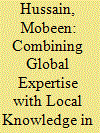

|
|
|
|
|
| Summary/Abstract |
This article traces the evolution of branded commodity advertising and consumption from corporeal health concerns to the racialisation of beauty through skin-lightening cosmetics in late colonial India. It centres two empirical foci: the marketing of personal hygiene products to Indian markets, and their racialised and gendered consumption. This article argues that the imperial economy tapped into and commodified ideals of cleanliness, beauty and fairness through marketing—ideals that continue to pervade contemporary South Asian communities. Contrary to claims that multinational corporations permeated Indian markets after the economic liberalisation of the late 1980s, there is a much deeper genealogy to the racialised imperial economy operating in European colonies. This article also examines the phenomenological underpinnings of imperial whiteness in colonial encounters to demonstrate how certain commodities appealed to Indians as ‘modern’ consumers, as well as how middle-class Indians and local entrepreneurs became active participants in the demand for, consumption and production of personal hygiene commodities.
|
|
|
|
|
|
|
|
|
|
|
|
|
|
|
|
| 2 |
ID:
132913
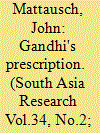

|
|
|
|
|
| Publication |
2014.
|
| Summary/Abstract |
For Gandhi, swaraj was premised upon the ethic of self-mastery and self-reliance, including taking responsibility for personal and public hygiene, which Gandhi himself was keen to practise and instil in his followers. While the article shows that much of Gandhi's biography and development occurred by chance, it focuses ultimately on the persistence of 'night scavenging' in India today, perhaps the starkest failure of Gandhi's swaraj campaign. The fate of Gujarat's numerous Bhangis, who remain trapped in lives of misery, filth and danger, is contrasted to that of England's earlier 'night workers', whose extinction as a professional class-it is argued-was brought about by chance events rather than by political design, intention or political campaigning. Ultimately, though, some people still have to do 'dirty' work which, in some cases, may be attractive even in India.
|
|
|
|
|
|
|
|
|
|
|
|
|
|
|
|
| 3 |
ID:
158076
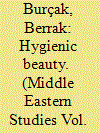

|
|
|
|
|
| Summary/Abstract |
This article examines discussions on Ottoman-Muslim female beauty, health and hygiene in the Hamidian Era (1876–1909). Analysing the Hamidian popular press, advice literature and textbooks for girls, the article argues that these discussions were more than just female ‘physical culture’ debates, involving larger issues of late-Ottoman regeneration. Wars, epidemics, massive migration movements and fluctuations in population pushed the late-Ottoman state to create healthy generations as a productive force to secure the Empire's future in general and the Ottoman Muslim population's welfare in particular. Maintaining good health expanded from a religious obligation into now also becoming a patriotic duty incumbent upon Ottoman subjects knowing and applying modern hygienic principles. Focus on Ottoman-Muslim women's procreativity shifted female beauty into a public discussion, now defined as a reflection of health. The new hygienic beauty discourse distinguished between preserving vs. harming one's health in the face of Western fashions and cosmetics: healthy beauty mirrored a ‘good complexion’.
|
|
|
|
|
|
|
|
|
|
|
|
|
|
|
|
| 4 |
ID:
192995
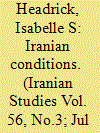

|
|
|
|
|
| Summary/Abstract |
The staff of the Alliance Israélite Universelle (AIU), an international educational philanthropy, were professionally and personally buffeted by health and medical concerns. This article examines the value of their letters, arguing they serve as a deep reservoir of biased yet valuable evidence that corroborates other sources while also providing insight into the health and disease conditions of Iran's provincial cities. This article also asks why, in the early twentieth century, AIU staff failed to acknowledge Iranians who were similarly invested in medical services and public hygiene. Ultimately, the letters help scholars witness historical evolutions in Iran and in the AIU staff's understandings of the Iranian social and medical landscape they inhabited.
|
|
|
|
|
|
|
|
|
|
|
|
|
|
|
|
| 5 |
ID:
142636
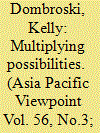

|
|
|
|
|
| Summary/Abstract |
Postdevelopment thinkers and writers have critiqued development discourse for its role in perpetuating inequality. In water, sanitation and hygiene (WASH) literature and interventions, the discourse used perpetuates inequality through classing anything other than private toilets as ‘without sanitation’. This implies that the people who use forms of hygiene and sanitation relying on collective toilets and alternative strategies are somehow unhygienic. Yet residents of Xining (Qinghai Province, China) rely on hygiene assemblages that do not always include private toilets, but nonetheless still work to guard health for families with young children. In this paper, I develop a postdevelopment approach to hygiene and sanitation starting with the place-based hygiene realities already working to guard health in some way, then working to multiply possibilities for future discursive and material hygiene realities.
|
|
|
|
|
|
|
|
|
|
|
|
|
|
|
|
| 6 |
ID:
095622
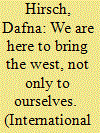

|
|
|
|
|
|
|
|